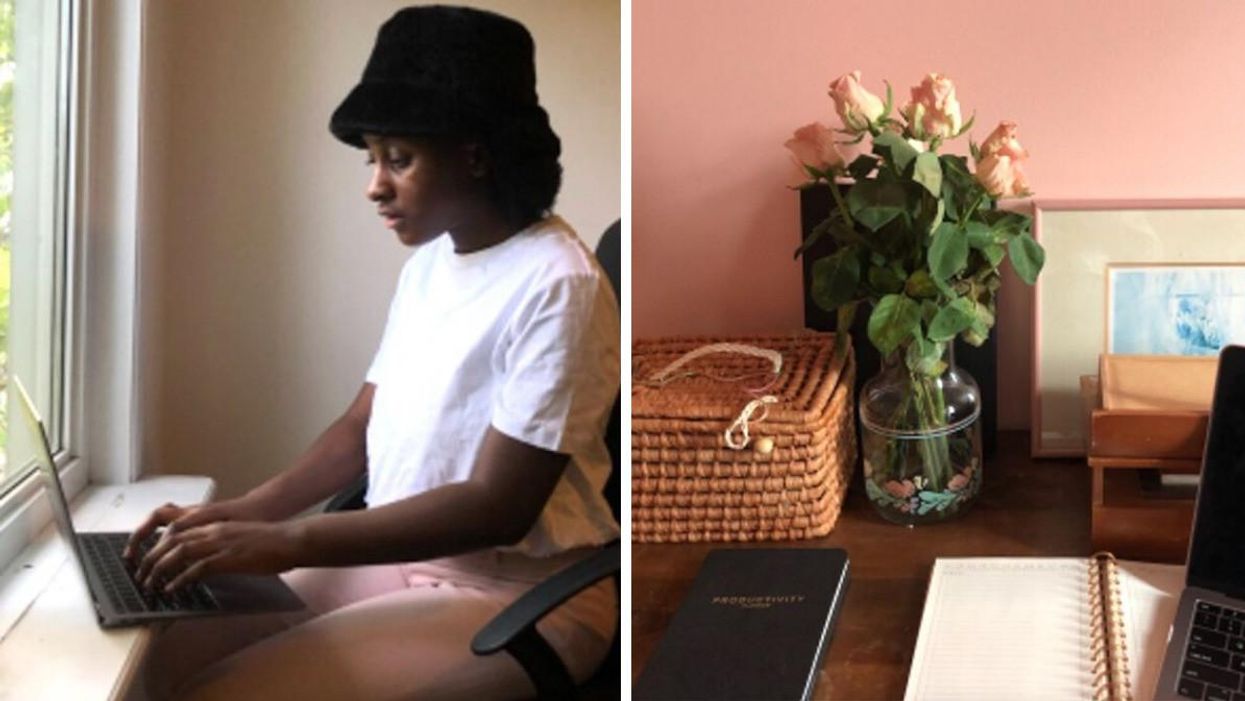5 Surprising Things That Helped Me Deal With Online University In Ontario
Cure that Zoom fatigue, pronto.

Jenn Kasiama was one of many online university students in Ontario.
This Essay article is part of a Narcity Media series. The views expressed are the author's own and do not necessarily reflect the views of Narcity Media.
The transition from in-person classes to online learning has been a difficult adjustment period for students in Ontario — and everywhere.
I’ve struggled with balancing my coursework and maintaining my mental health as the change of environment drastically set me back as a student.
Online and in-person learning are two different playing fields, and I knew I had to improve my habits before my grades suffered tremendously.
If you're a student struggling to stay on track or have a severe case of Zoom fatigue, here are five things that seriously improved my online learning approach.
1. Renovating your space
It's essential to have a dedicated area for studying when you’re at home.
Instead of the classroom, we have to use our imagination to create a space to complete assignments and listen to lectures. I had limited physical space to separate my workplace from my bedroom, but because I was also struggling to study outside of my home due to the winter-meets-pandemic blues, I knew I had to adjust.
I renovated my room into a comfortable — but not too relaxing — sanctuary fit for a student who also needs to unwind after hours of being online.
I have a desk area where everything from textbooks, notes, highlighters, and more are organized at my disposal. I listen to lectures and do my assignments away from the bed, in fear of wrecking the vibes and ensuring enough sunlight in my room to keep me grounded. I have created a balance that suits my lifestyle and needs as a student by changing my room into a study space.
2. Reach out to others when needed
Through virtual learning, there's a loss of social contact. It’s been tough to reach out to others, from chatting with peers to teacher-to-student social interaction during office hours. However, seeking support from the people around you is essential in surviving online learning.
As someone who is very shy and finds approaching others hard, I discovered that utilizing my school email, Zoom private messaging, and creating discussion posts to question assignments has been helpful. Response time ranges depending on the individual, but by putting yourself out there and communicating with others, you're already one step ahead in taking charge of your learning.
3. Forget multitasking
Unfortunately, multitasking is nearly impossible to accomplish with good results. I admit to being on my phone scrolling through social media when I should be paying attention to the lecture.
Still, I’ve seen how it’s affected my attention span and grades and decided that lifestyle is not for me anymore. I now remove all distractions from my study area. When I’m in class, I focus on writing my notes and even go as far as installing website blockers on my laptop and phone to limit the urges and improve my productivity.
Another way multitasking can show up is in doing assignments. Just stick to one thing, complete the task at hand and move on to the next — no need to do it all at once.
4. Improve time management skills
Staring at a computer screen all day isn't ideal for anyone. I’ve suffered from eye strain and headaches from constantly being on call and doing assignments without a break. It’s tiring and numbing, not benefiting anyone despite the work put into school projects.
I made sure to schedule all the exact times needed for online schooling in my physical agenda and online calendar to resolve that issue. I then schedule breaks between classes to avoid my laptop and either stretch or get something to eat.
It may seem like something small, but it has impacted me positively and reduced the amount of stress my body gets from being in front of a computer all day.

5. Get outside
One of the best ways to recharge batteries while “going to university” online is to go outside. I spent time with friends and family when possible. I spent time by myself in nature. I read books.
Connecting with people and experiences in real life helped give me the psychological energy I needed to get through online learning.
What you do outside of class is just as important as what you do during it. Be with other people who can relate to your stress — they’re probably going through their own version of it too — and by talking about it, you can maybe get to a point where you can laugh about it. Sharing with others is essential to help get you in a mindset to go back online.
The thing about “living” online is it’s easy to forget that there’s still a great “life” outside of your laptop. For me, being engaged in activities and strategies that have reminded me of that have helped me cope immensely.